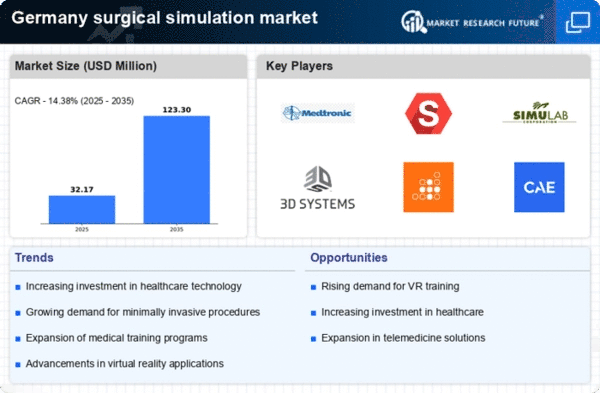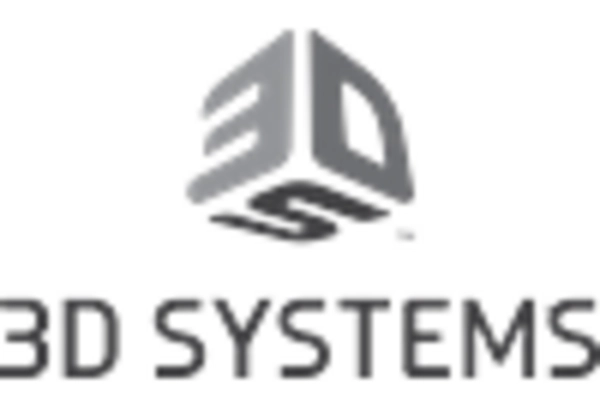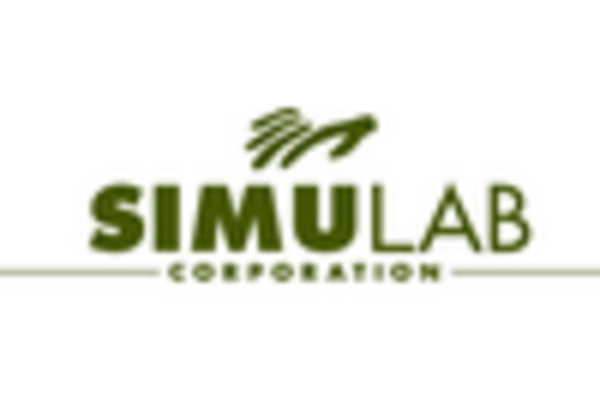Government Initiatives and Funding
Government initiatives in Germany are playing a pivotal role in the expansion of the surgical simulation market. With a focus on enhancing healthcare quality, the German government has allocated substantial funding towards the development and implementation of advanced surgical training programs. This financial support is aimed at fostering innovation in medical education, thereby increasing the adoption of simulation technologies. Reports indicate that public funding for healthcare training has risen by 20% in recent years, which directly benefits the surgical simulation market. As a result, educational institutions and hospitals are more likely to invest in simulation tools, ensuring that healthcare professionals are well-prepared for real-world surgical challenges.
Integration of Virtual Reality in Training
The integration of virtual reality (VR) into the surgical simulation market is transforming the landscape of medical training in Germany. VR technologies offer immersive experiences that allow surgeons to practice complex procedures in a risk-free environment. This innovative approach not only enhances skill acquisition but also improves retention of knowledge among trainees. The surgical simulation market is expected to see a surge in VR-based training solutions, with estimates suggesting a growth rate of 25% in this segment alone. As educational institutions and hospitals recognize the benefits of VR, the demand for these advanced simulation tools is likely to escalate, further solidifying their role in surgical education.
Collaboration Between Academia and Industry
Collaboration between academic institutions and industry stakeholders is emerging as a crucial driver for the surgical simulation market in Germany. Partnerships facilitate the exchange of knowledge and resources, leading to the development of cutting-edge simulation technologies. These collaborations often result in tailored training programs that meet the specific needs of healthcare providers. Recent data indicates that joint ventures in medical technology have increased by 30% over the past few years, highlighting the growing synergy between academia and industry. Such alliances not only enhance the quality of surgical training but also contribute to the overall advancement of the surgical simulation market.
Focus on Continuous Professional Development
The emphasis on continuous professional development (CPD) among healthcare professionals is significantly influencing the surgical simulation market in Germany. As medical practices evolve, there is a pressing need for surgeons to stay updated with the latest techniques and technologies. Simulation training provides an effective means for ongoing education, allowing practitioners to refine their skills and adapt to new surgical methods. The market is witnessing a shift towards CPD programs that incorporate simulation, with a projected increase in participation rates by 40% over the next few years. This trend underscores the importance of lifelong learning in the medical field and its impact on the surgical simulation market.
Rising Demand for Minimally Invasive Procedures
The surgical simulation market in Germany is experiencing a notable increase in demand for minimally invasive procedures. This trend is driven by the growing preference among patients for surgeries that promise reduced recovery times and lower risks of complications. As healthcare providers seek to enhance their surgical offerings, the integration of simulation technologies becomes essential. The market for surgical simulation is projected to grow at a CAGR of approximately 15% over the next five years, reflecting the increasing reliance on advanced training methods. Furthermore, the emphasis on improving surgical outcomes through simulation training is likely to bolster the market, as practitioners aim to refine their skills in a controlled environment.
















